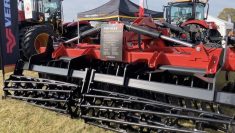Strong sales of a limited-edition tractor line helped offset tighter margins and generally lower demand in fiscal 2016 for farm equipment manufacturer Buhler Industries.
The Canadian company last Thursday booked a net loss of $2.7 million on $274.1 million in sales for its year ending Sept. 30, 2016, up from a $5.3 million loss on $245.7 million in sales in fiscal 2015.
Sales of the company’s Versatile Legendary Limited Edition tractors, produced last summer to mark 50 continuous years of four-wheel-drive tractor production, offset “weak commodity prices that continue to contribute to reduced sales levels,” the company said.
Read Also

The U.S. corn crop could be the biggest ever. That’s terrible news for America’s farmers.
The USDA predicts a record corn crop for U.S. farmers, who question the agency’s accuracy amidst high debt and low crop prices.
The Winnipeg firm, now owned mainly by Russian combine manufacturer Rostselmash, makes Versatile four-wheel- and front-wheel-drive tractors and Farm King implements and equipment such as augers, mowers, sprayers, front-end loaders and bale carriers. It launched a new vertical tillage tool under both brands last summer.
Buhler said its net loss on the year was due mainly to a decrease in margin, along with higher interest costs and research and development spending. Gains on the sale of surplus assets and foreign exchange helped offset those costs, the company added.
While the company’s year-to-date sales in North America, particularly in the U.S., have declined, it expects sales to increase “slightly” in 2017.
Buhler said it “continues to pursue increases in market share,” though lower commodity prices are expected to continue to drag on demand for farm equipment.
Looking ahead, margins are still expected to be “weak due to aggressive competition,” and inventory levels are expected to remain lower, Buhler said. However, the company added, profitability from operations is expected to increase due to its “cost reduction initiatives.”
Offsetting those cost cuts, however, is a weaker Canadian dollar, as many components and parts are paid for in U.S. dollars, the company noted. — AGCanada.com Network












